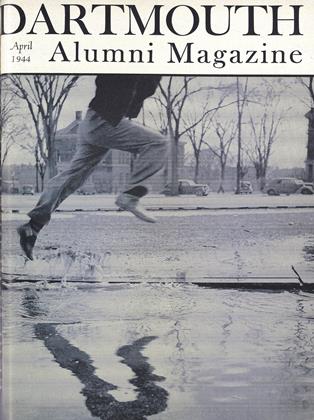IF THE GOVERNMENT at Washington were not so eager to plan every one's private life for him, there would probably be less apprehension felt by college educators because of the prospect that, following the war, there will come a period in which government funds will be needed to finance some of the educational work among discharged service men, whose opportunities for higher education were rudely interrupted by the war. There seems to be little disagreement over the proposition that such government aid will be necessary, financially speaking; but there has been a great deal of doubt concerning the administration of that aid—whether it should be federally directed, or conducted by purely local or state authority.
It is notorious that he who pays the piper feels that it is his privilege to call the tune. Moreover, Washington's armies of bureaucrats have revealed a passion for planning things for others which leads to a fear that such government assistance might presage a centralization of educational authority. More than a broad hint of such apprehension is to be found in the recently issued annual report of President Conant to the Harvard Board of Overseers, and it is safe to say that the President of Harvard is by no means alone therein.
It is difficult to find in the record made by Washington's eager planners much to inspire faith in the idea that federal oversight of college education would be a salu- tary thing. It is easier to see that such a system would be another step aside from the traditional American Way, possibly justified during the existence of a war, but wholly unwelcome and regrettable in times of peaces Centralized control of university education seems to many a thing to avoid, and one knows only too well what sometimes follows when the camel's head once gets inside the tent. There is usually a plausible plea for Fascism based on the idea that it is "so efficient"; but one needs always to remember that it is not always efficiency for the sort of things a free and democratic people cherish as forming the essence of existence. Hence the strong tendency to insist that, while the federal government may well assist to enable the teaching, it should not dictate arbitrarily as to the things taught.
 View Full Issue
View Full Issue
More From This Issue
-
 Article
ArticleCOLLEGE MEN IN POLITICS
April 1944 By DAYTON D. McKEAN -
 Article
ArticleSANBORN ENGLISH HOUSE
April 1944 By LEON BURR RICHARDSON '00 -
 Class Notes
Class Notes1918
April 1944 By ERNEST H. EARLEY, DONALD L. BARR -
 Class Notes
Class Notes1935
April 1944 By ENSIGN JOHN D. GILCHRIST JR., BOBB CHANEY -
 Lettter from the Editor
Lettter from the EditorLetters from Dartmouth Men in the Armed Forces
April 1944 By H. F. W. -
 Class Notes
Class Notes1919
April 1944 By J. KENNETH HUNTINGTON
P. S. M.
-
 Article
ArticleSea-Anchor for Dartmouth
January 1943 By P. S. M. -
 Article
ArticleLarboard Watch, Ahoy!
August 1945 By P. S. M. -
 Article
ArticleWe, The People
August 1945 By P. S. M. -
 Article
ArticleEmbattled Independents
February 1946 By P. S. M. -
 Article
ArticleSi Monumentum Requiris
March 1946 By P. S. M. -
 Article
ArticleThe Guinea's Stamp
May 1946 By P. S. M.
Article
-
 Article
ArticleReport of the Executive Committee
DECEMBER 1927 -
 Article
ArticleAttains Flag Rank
February 1947 -
 Article
ArticleWith the Big Green Teams
MAY 1968 -
 Article
ArticleThe Education Gap
January 1996 By James O. Freedman -
 Article
ArticleA Medal of Honor
JANUARY 1999 By John Scotford '38 -
 Article
ArticleWith the D.O.C.
February 1944 By Tom Dent.

